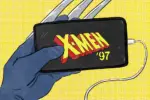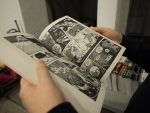Since the 1940s, comic books have been an entertainment staple for generations of Americans. Through them, the stories of superheroes, such as Teen Titans and the X-Men, have turned into timeless classics sewn into the core of American pop culture.
Yet, the comic book as a creative medium is capable of relaying more than just the epic odysseys of superhuman beings. Far from being a kitsch form of entertainment, comic books can explore much more mature philosophical themes. Instead of leaving readers in awe with epic battle scenes, they can stupefy fans by presenting them with surreal storylines and angst-ridden characters.
Here are just a few comic books capable of challenging your most fundamental understandings of human nature and society.
1. Saga (2012 – present)
The American comic book company Image Comics remains at the forefront of producing non-superhero comic books, and the fantasy comic book series “Saga” is arguably one of its most popular among the company’s fans.
Written by Brian Vaughn and illustrated by Fiona Staples, “Saga” follows the journey of its two main characters, Alana and Marko. The two lovers each belong to two warring extraterrestrial species and find themselves fleeing from space authorities with their only daughter, Hazel. Readers have compared the comic book series to “Game of Thrones,” “Star Wars” and “Romeo and Juliet, but the series holds a unique quality to it that has left it exceptionally popular among fans.
While still enjoying the setting of a sci-fi fantasy universe, Vaughn and Staples’ comic touches on themes relevant to real life, like war and violence. In addition, fans have lauded Vaughn and Staples for having included LGBT characters in “Saga” and for humanizing their multi-dimensional female characters — even though they’re still, in fact, extraterrestrials.
2. Outcast (2015 – 2018)
Image Comics’ horror comic “Outcast” offers a new take on the common demon possession trope. Known for creating “The Walking Dead” comics, Robert Kirkman authored the horror comic in partnership with Paul Azaceta and the illustrations of Elizabeth Breitweiser.
Kirkman’s story follows the arduous and solitary life of Kyle Barnes. The memory of both his mother and wife being demonically possessed and the violence he inflicted against both of them during their exorcism torments Barnes. He chooses to isolate himself from others, convinced that he only brings hurt and pain to other humans. However, Barnes eventually has no choice but to continue fighting the demons that are manifesting within his friends and family. Undoubtedly, the true horror that the demons in “Outcast” evoke is their ability to ruin the lives of families.
“Outcast” received critical acclaim for its willingness to bring a more realistic touch to the trope of demon possession, while also keeping reality suspended with the presence of the demons and Barnes’ own supernatural gifts. Following the popularity that it garnered amongst comic book fans, a television adaptation was created through Cinemax. Two seasons were aired on television, but the show failed to get renewed for a third season.
3. Descender (2015 – 2018) and Ascender (2019 – present)
Another one of Image Comics’ publications, “Descender” follows the story of a robot boy, called TIM-21, who wakes up to find himself in a troubling, conflict-ridden future. Without much guidance, readers witness as TIM-21 struggles to survive in a world in which androids are outlawed and hunted like animals in what resembles a genocide.
Echoing some of the classic sci-fi author Isaac Asimov’s commentary on human-robot relations, author Jeff Lemire and illustrator Dustin Nguyen breathe life into the philosophical question of whether a robot might have more humanity than actual humans.
“Descender” reached its end in 2018, with Lemire announcing the creation of his next comic-book project. After publishing more than 30 issues, Lemire felt pleased with the conclusion of the space opera.
In an interview with Heat Vision, Lemire commented on the prospects for “Ascender,” his new comic book series rumored to appear in 2019: “For me, I’m still figuring out what it means. I’m in the process of figuring out this world, doing the world building, and how it works and where it comes from.”
So far, Lemire has hinted that “Ascender” will be similar to “Descender,” but will have a more magical tone replace the mechanical aesthetic of TIM-21’s world.
4. Moon Knight (2014 – present)
Preserving its superhero narrative, Marvel Comics introduced its “Moon Knight” series to its fans in 2014. Although the superhero Moon Knight has existed since the 1970s, Marvel brought a more modern light to the character’s title series.
The main character, Marc Spector, suffers from dissociative identity disorder and is institutionalized in a mental hospital at the beginning of the comic. Yet, Marc is also tormented by the presence of the Egyptian moon god Khonshu, who wants to use him as his avatar, or his agent, on Earth. Set in a monochromatic color palette, the comic’s universe explores, through a grim light, the anguish, absurdity and confusion that mental illness can bring about, while never quite fully addressing whether Marc is truly insane or not.
Uncharacteristic of the company, Marvel has not made a television or movie adaptation of the Moon Knight series, nor has it referenced the character in its existing live-action productions. Fans of the series don’t seem to have a problem with this, since Marc’s storyline is so markedly different from the likes of Captain America and Iron Man. For now, “Moon Knight” will remain enjoying fans’ adoration while still residing in the pages of Marvel’s comic books.
5. Infidel (2018 – present)
Image Comics continues its streak of commenting on social issues with its series “Infidel,” by rehashing the classic haunted house storyline. “Infidel” is a horror story told through the eyes Aisha, a Muslim woman who moves with her non-Muslim fiancé into an old apartment building.
Like in any haunted house story, the family encounters supernatural entities. Appearing after a mysterious bombing in their apartment building, the spirits tormenting them are not the typical ghouls from horror movies. Instead, author Pornsak Pichetshote and illustrator Aaron Campbell explained that the entities represent the real-life fears that people of color experience living in the 21st century.
In 2018, the “Infidel” series burst with praise. After the release of its second issue, the series was announced to have landed itself a movie deal. Following the sensation of the movie “Get Out,” which took a similar approach to exploring racism through horror, the movie adaptation of “Infidel” has the potential to become a success as well.
Classic superhero narratives and explosive battle scenes will always find a place in the comic book scene. However, Image Comics and even Marvel Comics have shown how flexible comic books are for telling darker, more surreal stories. By exploring revealing the horror present in everyday human experiences, such as mental illness and racism, these more somber comic books can make for a poignant, yet unforgettable read.
















